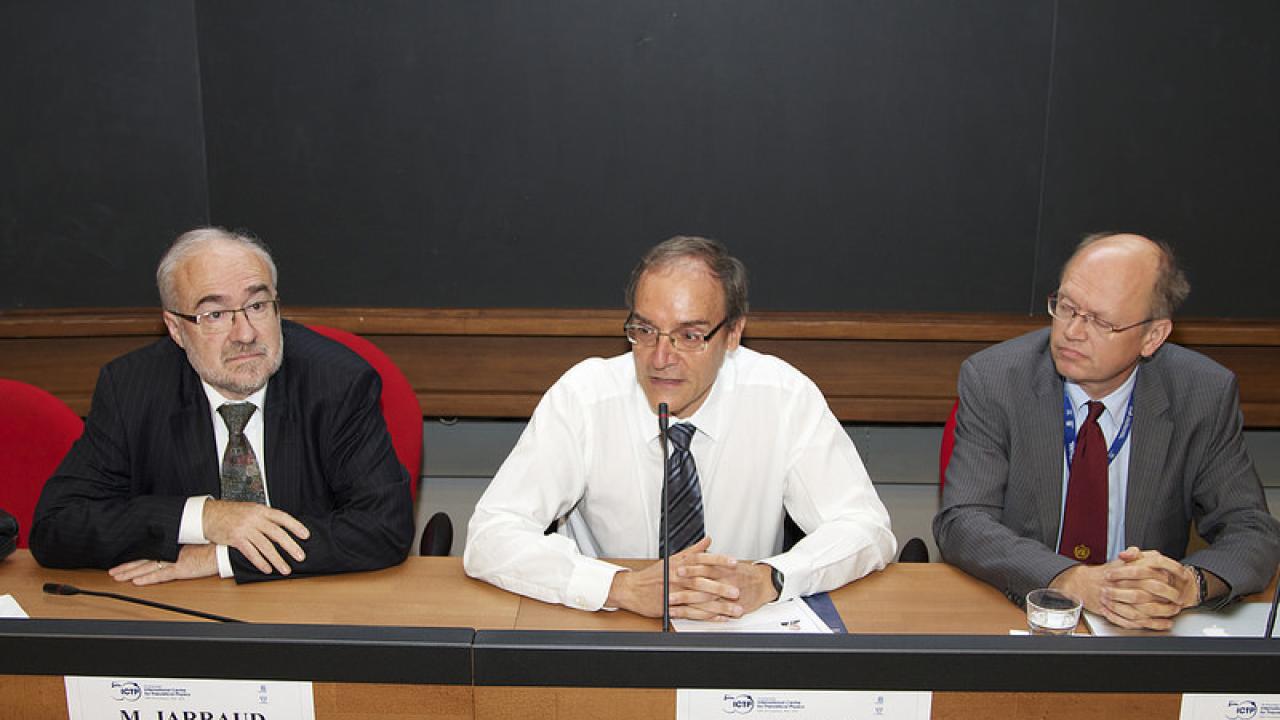
“Climate, like football, is something where everyone is an expert,” said the World Meteorological Organisation’s (WMO) Secretary General Michel Jarraud, launching Day 2 of ICTP's 50th anniversary celebrations with a session on “The Future Earth.”
Introduced by ICTP climate scientist Filippo Giorgi, Jarraud and current Intergovernmental Panel on Climate Change (IPCC) Vice-Chair Jean-Pascal van Ypersele spoke about the challenges of climate change and how scientists and policymakers must work together to overcome them.
Jarraud outlined the highs and lows revealed by climate scientists over the past several decades. Science has enhanced prediction and early warning systems, so fewer people are now dying from extreme weather events such as floods and droughts compared with the casualties 60 or 70 years ago. Nevertheless, the economic toll of increasingly extreme events, worsened by the highest atmospheric levels of carbon dioxide, methane, and nitrous oxide in the last 800,000 years, is rising significantly.
Jarraud called for a "global framework for climate services" to present better packages of scientific information to politicians. "Scientific progress is not translating into concrete products for decision makers," Jarraud said. The global framework will focus on the expertise of centres like ICTP, he added, praising the Centre's ability to build "capacity in developing countries and keeping scientists there".
Van Ypersele introduced the IPCC, founded in 1988 by the UN Environmental Program and the WMO and winners of the 2007 Nobel Peace Prize, as "the first climate service" of the kind Jarraud was advocating. The IPCC's Fifth Assessment Report, the result of several years of work by hundreds of scientists from around the globe, has already published the work of its three Working Groups on physical science, adaptation, and mitigation, and will release the synthesis of these reports in early November.
Van Ypersele recognised ICTP's efforts in building capacity in climate research. ICTP's contributions have both appeared as research cited in the report and enriched the pool of scientists eager to take part in the work. "ICTP is at the forefront of inclusion of developing country scientists in physics activities, including in climate physics," he said. "Many future authors for IPCC reports from developing countries will have been trained here."
Sessions in the afternoon focussed on the challenges that women scientists face in pursuing careers in a male-dominated field. In a panel discussion, participants agreed that women in physics face many challenges. They spoke about institutional barriers - in education, in culture, and in attitudes - that they agreed should be easy to tackle and fix. Luciano Maiani, chairman of the ICTP Scientific Council and former Director General of CERN, related how he had tried to start a kindergarten at CERN and had been denied by the unions. Chiara Nappi, an Italian physicist who teaches at Princeton, spoke about educational structural differences between the US and Italy that in her experience led to bottlenecks preventing women entering physics.
ICTP's anniversary celebrations will continue during the week with science-focussed sessions on extreme events and natural disasters, renewable energies, and a lecture on "Our African Origins". Visit the ICTP website at www.ictp.it for more details.













